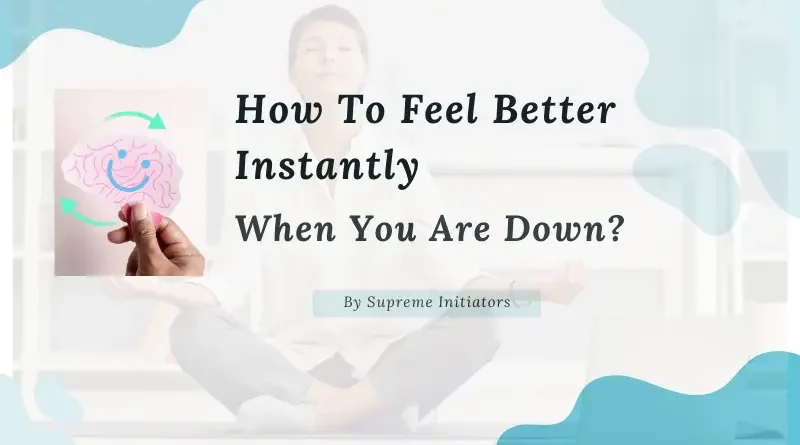How To Feel Better Instantly When You Are Down?
Everyone has good and bad days. The constant barrage of information and responsibilities can leave us feeling drained and disheartened. But some people know how to feel better instantly because they have special ways to deal with bad feelings. If you’re not one of those people and find it hard to feel good when you’re sad, this article can help. It’s okay to feel sad or upset sometimes, but you shouldn’t stay that way for too long. Here are some strategies we can employ to instantly feel better, regain a sense of balance & calm, and start feeling happy again.
In this article, we’ll explore actionable techniques to address common mental hurdles such as overthinking and anxiety, providing practical solutions to help you feel better instantly.
Table of Contents
Strategies to Alleviate Negative Mental States
Below are some strategies for activities tailored to address each of the mentioned mental states and help you know how to feel better instantly.
1. Overthinking
- Practice mindfulness meditation to ground yourself in the present moment.
- Journaling to unload your thoughts and gain clarity on your concerns.
- Engage in creative activities such as painting or crafting to distract your mind from repetitive thoughts.
2. Anxious
- Deep breathing exercises to calm your nervous system.
- Progressive muscle relaxation to release physical tension.
- Take a walk in nature to connect with the soothing environment and ease anxiety.
3. Tired
- Take a power nap to recharge your energy levels.
- Engage in light physical activity like stretching or yoga to invigorate your body.
- Drink a refreshing cup of green tea for a gentle energy boost without the crash.
4. Sad
- Reach out to a trusted friend or loved one for support and comfort.
- Engage in activities that bring you joy, such as listening to uplifting music or watching a favorite movie.
- Practice self-compassion and allow yourself to feel your emotions without judgment.
5. Stressed
- Practice deep breathing exercises or guided imagery to induce relaxation.
- Take a break and engage in a hobby or activity that brings you pleasure.
- Prioritize tasks and delegate where possible to alleviate feelings of overwhelm.
6. Angry
- Take a timeout and remove yourself from the situation to cool down.
- Engage in physical activity like running or boxing to release pent-up energy.
- Practice assertive communication techniques to express your feelings constructively.
7. Lazy
- Break tasks into smaller, manageable steps to make them feel less overwhelming.
- Set specific and achievable goals to motivate yourself to take action.
- Create a supportive environment by removing distractions and setting up a comfortable workspace.
8. Burnt out
- Take a mental health day to rest and recharge.
- Practice saying no to additional commitments and prioritize self-care.
- Engage in activities that nourish your soul, such as spending time in nature or indulging in a hobby.
Remember, it’s important to listen to your body and mind and choose activities that resonate with you personally. Experiment with different strategies until you find what works best for you in each situation.
Best Activities To Follow Corresponding To Your Mental State
We understand that it’s hard to choose the best one wisely. So, let us take a look at some magical combinations that actually work out, make you feel energetic, and give you positive vibes instantly!
1. Overthinking→Writing
Writing can help alleviate overthinking by providing an outlet to express and organize your thoughts, allowing you to gain clarity and perspective on your concerns.
2. Anxiety→Meditation
Meditation practices, such as mindfulness meditation, can help reduce anxiety by promoting relaxation and calming the mind, allowing you to manage stress more effectively.
3. Tiredness→Exercise
Engaging in physical exercise, even if you’re feeling tired, can actually boost your energy levels by increasing blood flow and releasing endorphins, helping you feel more awake and alert.
4. Sadness→Art/Crafts
Artistic activities like drawing, painting, or crafting can provide a creative outlet for processing emotions and expressing yourself, offering comfort and solace during times of sadness.
5. Stress→Organization/ Cleaning
Taking the time to organize your surroundings, whether it’s decluttering your space or creating a to-do list, can help reduce stress by providing a sense of control and orderliness in your environment.
6. Anger→Physical Activity
Engaging in physical activity, such as running, boxing, or practicing martial arts, can help release pent-up energy and aggression in a healthy way, allowing you to manage and diffuse feelings of anger.
7. Laziness→Goal Setting
Setting specific and achievable goals can help combat laziness by providing motivation and direction, breaking tasks into smaller, manageable steps that are easier to tackle.
8. Burnout→Self-Care
Practicing self-care activities, such as taking a relaxing bath, meditating, or indulging in a hobby, can help replenish your energy and prevent burnout by prioritizing your well-being and restoring balance in your life.
These pair of combinations of each mental state with a corresponding activity can help address and alleviate the associated challenges, promoting overall mental health and well-being.



